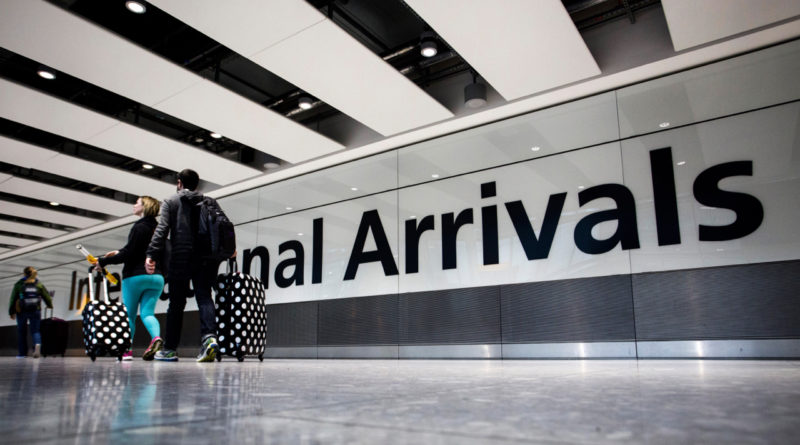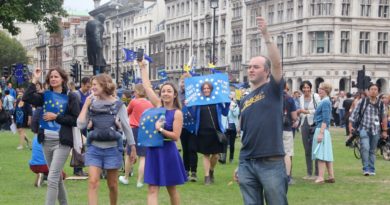One year after the referendum, where is home?
One year ago, on 23 June 2016, the UK decided by referendum to leave the European Union. Only yesterday, a year later, discussions started between the UK and the EU on the future status of EU nationals living in the country. Meanwhile, EU citizens in Britain and Britons in the rest of the EU – about 4.5 million people – have been living in uncertainty. As their rights are put in question, many ask: where is home now?
This is how a Polish and a Belgian feel about the situation. The contributions are from the book “In Limbo: Brexit testimonies from EU citizens in the UK,” self-published with Amazon by a group of EU citizens to raise awareness about their rights. The testimonies are reproduced here with permission.
I have been living in the UK for 11 years now, which is pretty much my whole adult life. I have been a student here, a worker, a business entrepreneur, an activist, a friend, a lover, and a volunteer. I love London because it gave me all these opportunities. I consider London my home. I can hardly imagine living anywhere else. My community is here. Or communities, because I have many different groups of friends. I feel like I belong here. That’s why I love London. The people here are from everywhere and they all can feel at home here, and knowing all the various types of people I’ve met here has made me a better person, I think. And that’s one of the main reasons why I cannot imagine living anywhere else. Londoners are from everywhere and they don’t have to be British to belong in London.
And yet, after the Brexit Referendum, something in me broke. My heart sunk. Until then, I was at home here, and then all of a sudden that day it didn’t really feel quite like home anymore… For the first time in many years, I thought I should go…
But where would I go? Since I made London my home, every time I went back to visit my friends and family in Poland, I felt a bit out of place. As if people were looking at me and thinking: ‘you’re not from around here.’ This never happens in London! Every other person here came from somewhere else and yet, or perhaps because of that, we can all feel like proud Londoners. The variety is what makes London. The languages, the cuisines, the cultures…
Or at least it used to feel that way… Everything feels a little bit different now, since the Brexit vote.
So where is my home now? Honestly, I do wonder these days… If I go back, I would feel out of place, I left so many years ago. If I stay, I feel like an intruder.
Many people are scared. Their future has all of a sudden become uncertain, even for those who have lived here for many long years, making a home, working hard, studying, making friends, falling in love with the culture, just like me. Living with uncertainty is likely what awaits us over the period of the next two years while our future is being negotiated by politicians.
But for me, personally, the hatred is the worst part. I do know that most people did not vote for Brexit because of xenophobia. The post-Referendum panic told me that most people’s Leave votes were an expression of confusion and frustration with the EU. Nevertheless, the open expressions of racism and xenophobia that followed Brexit have taken a toll on many of us. Some of us don’t feel as welcome anymore…
Magda Oljejor, Poland
When I moved to Oxford to do a postdoc and later as a senior lecturer, my initial impression of the UK was one of openness and cosmopolitanism – a stark contrast with Belgian academia, which I experienced as being more closed off.
As we’ve been renting, moving over ten times the past 15 years, we were eager to buy a house in Oxfordshire. We want a place to call home, and believed the UK could be that place. But now, since the Referendum in which we had no say, the plan of buying a house is off. We don’t know if we can stay here, or if our rights will remain intact, for instance, to work here, to use the NHS, or even whether our children can continue to attend school. Because our family left the UK for 11 months over the past five years, we do not qualify for permanent residency. Not a day goes by that I do not think about this. The UK keeps on shifting the goal posts for permanent residency and citizenship. I worry that even if we are allowed to stay, the UK could reverse its decision several years down the line and I would still not have my rights secured with PR and citizenship forever out of reach.
While people here are friendly and supportive, I think they do not have a good sense of how emotionally draining this is. My line manager said that if getting permanent residency is so difficult, why not go for British citizenship? He had no idea that permanent residency is a prerequisite for citizenship, nor that citizenship requires tests and fees in excess of £1000. Some people even tell me I should not mention my situation. For instance, one woman blamed me for spoiling the mood, and bringing politics into a discussion where I made a joke about being deported. She said she voted out but of course I was allowed to stay, as far as she’s concerned. My biggest worry is that we are the UK’s main negotiation card (by the government’s own admission), and so that if negotiations go badly we could end up becoming collateral damage.
Last year my father-in-law died. He was a hobby painter, and he left us a painting of one of his favourite places, a little cabin in the Swiss Alps. Now, we cannot hang the painting as it is heavy and would leave a mark in the wall. We were going to hang it in our first home. But now it remains wrapped in bubble-wrap and blankets, a symbol of our lives on hold, and a reminder that we cannot call the UK home. Where is home? I used to believe that home is where the heart is, not necessarily where you are born. Now, my heart is no longer in the UK, and so as a result I feel emotionally homeless.
Dr Helen De Cruz, Belgium
Photo: London, Heathrow Airport. © European Union, 2015. Source: EC / Jack Taylor.





